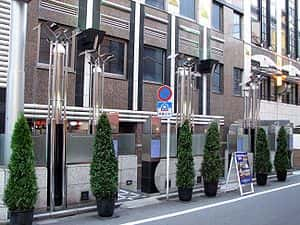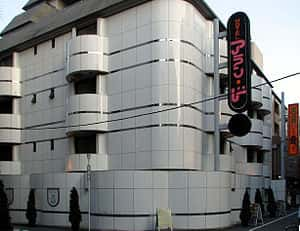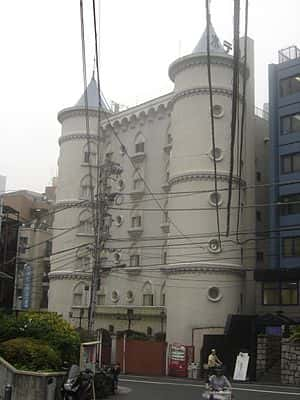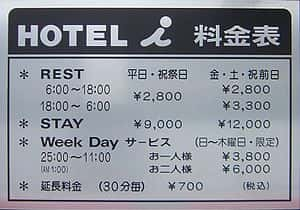Love hotel
A love hotel is a type of short-stay hotel found around the world operated primarily for the purpose of allowing couples privacy for sexual activities. The name originates from "Hotel Love" in Osaka which was built in 1968 and had a rotating sign.
See also: Global list of girl friendly hotels




Contents
Distinguishing characteristics
Love hotels can usually be identified using symbols such as hearts and the offer of a room rate for a "rest" (休憩 kyūkei?) as well as for an overnight stay. The period of a "rest" varies, typically ranging from one to three hours. Cheaper daytime off-peak rates are common. In general, reservations are not possible, leaving the hotel will forfeit access to the room, and overnight stay rates only become available after 10:00 p.m. These hotels may be used for prostitution, although they are sometimes used by budget-travelers sharing accommodation.
Entrances are discreet and interaction with staff is minimized, with rooms often selected from a panel of buttons and the bill settled by pneumatic tube, automatic cash machines, or a pair of hands behind a pane of frosted glass. Although cheaper hotels are often quite utilitarian, higher-end hotels may feature fanciful rooms decorated with anime characters, equipped with rotating beds, ceiling mirrors, karaoke machines, unusual lighting, or may be styled similarly to dungeons or other fantasy scenes, sometimes including S&M gear.
These hotels are typically either concentrated in city districts close to stations, near highways on the city outskirts, or in industrial districts. Love hotel architecture is sometimes garish, with buildings shaped like castles, boats or UFOs and lit with neon lighting. However, some more recent love hotels are very ordinary looking buildings, distinguished mainly by having small, covered, or even no windows.
Around the world
Japan
The history of love hotels (ラブホテル rabu hoteru) can be traced back to the early Edo Period, when establishments appearing to be inns or teahouses with particular procedures for a discreet entry or even with secret tunnels for a discreet exit were built in Edo and in Kyoto. Modern love hotels developed from tea rooms (chaya (茶屋)) used mostly by prostitutes and their clients but also by lovers. After World War II, the term tsurekomi yado (連れ込み宿 lit. "bring-along inn") was adopted, originally for simple lodgings run by families with a few rooms to spare. These establishments appeared first around Ueno, Tokyo in part due to demand from Occupation forces, and boomed after 1958 when legal prostitution was abolished and the trade moved underground. The introduction of the automobile in the 1960s brought with it the "motel" and further spread the concept.
The original term has since fallen into disuse within the industry itself thanks to the euphemism treadmill, and an ever-changing palette of terms is used by hotel operators keen on representing themselves as more fashionable than the competition. Alternative names include "romance hotel", "fashion hotel", "leisure hotel", "amusement hotel", "couples hotel", and "boutique hotel".
South Korea
Love hotels (Korean: 러브호텔), also known as love motels, first appeared in South Korea in the mid-1980s. They were originally called "Parktel" (Korean: 박텔). Their boom and growth was originally attributed to the 1988 Olympics which took place in Seoul. The hotels have historically been seen as seedy, with some residents speaking out against them and not wanting them within certain distances of schools and residential areas. However, some hotel owners have tried to remove that element from their business by upgrading, offering cleaner modern services, and removing some of the more sexual elements from their decor. They are considered a taboo topic in South Korea and a photo exhibit of love motels taken by a foreigner created a controversy in 2010.
Thailand
Thailand has had love motels since 1935 and there are approximately 100 establishments in Bangkok most densely located around Ratchadaphisek road. The government no longer issues building permits for these types of motels, but some businesses work around the laws. In addition to short-stay, the motels are also used by, and recommended to, foreign travellers on a budget.
Other countries
Similar establishments also exist in other East Asian countries and regions such as Singapore, Taiwan and Hong Kong.
The same concept also exists in Central and South America. In Guatemala, they are called "autohotels"; in Mexico, "hoteles de paso"; in Chile "motel" or "hotel parejero" (couples' hotel); in the Dominican Republic, "cabañas", "moteles" or "estaderos"); in Argentina and Uruguay, "albergue transitorio" or more informally, "telo"; in Brazil, Colombia and Puerto Rico, they are simply called "motels" (the word is exclusively used for love hotels).
In the United States and Canada, certain motels in low-income urban areas often serve similar functions as a Japanese love hotel. Colloquially known as "No-Tell Motels," these are becoming scarce as local laws increasingly require renters' identification information to be recorded and given to law enforcement agencies.
In Oceania, New Zealand opened its first love hotel in May 2011, and Australia opened its first love hotel in August 2011.
Economic aspects
The annual turnover of the love hotel industry is more than ¥4 trillion, a figure double that of Japan's anime market.
It is estimated that more than 500 million visits to Japan's 37,000 love hotels take place each year, which is the equivalent of around 1.4 million couples, or 2% of Japan's population, visiting a love hotel each day. In recent years, the love hotel business has drawn the interest of the structured finance industry.
Several transactions have been completed where the cash flows from a number of such hotels have been securitised and sold to international investors and buy-out funds.
Love Hotels & Adult Resorts
Check out WikiSexGuide Adult Classifieds!
See Also
- North America | South America | Europe | Africa | Asia | Oceania

